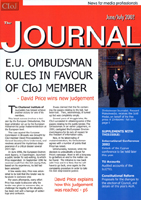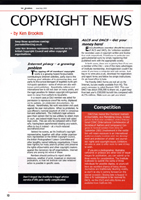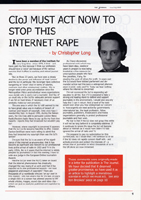Internet Rape – Piracy On The Web
The Journal of The Chartered Institute of Journalists — July 2002
The following derives from a letter sent to the Chartered Institute of Journalists in London which chose to publish it as feature in its magazine The Journal. The item concerns web piracy and the growing menace of blatant and unscrupulous theft of web site material owned and published by journalists.
By Christopher Long
CIoJ MUST ACT NOW TO STOP THIS INTERNET RAPE
 I have been a member of the Institute for a very long time – since 1979, I think – and have paid my fees because I think our profession should have a 'voice' and because of the various services that it offers to working and retired journalists.
I have been a member of the Institute for a very long time – since 1979, I think – and have paid my fees because I think our profession should have a 'voice' and because of the various services that it offers to working and retired journalists.
But, in those 23 years, we have seen a steady decline in the power and influence of most 'unions' and the IoJ in particular. We no longer have collective bargaining or 'union' clout in terms of salaries, contracts and other employment matters. We no longer need union press accreditation since the Metropolitan Police and individual news organisations now decide who is and is not a journalist. And few of us could rely on the IoJ for adequate pension support if we fell on hard times. If necessary most us probably make our own provision.
The one area in which the IoJ still seemed to me to have great value was in matters of breach of contract and breach of copyright. Only once have I needed this help: in August 1995, during the Balkan wars, the IoJ was able to persuade London News Radio/Reuters Radio News to pay up for my front-line reports – reports they had broadcast but wouldn't pay for!
However, where copyright is concerned it appears that the IoJ (or its lawyers) has little to offer. Indeed Darlow Smithson were more willing to admit that they had breached my copyright than was the IoJ's lawyer!
 I'm sure that the IoJ is as aware of the significance of the internet as anyone else: that it has become as significant and relevant to our professional lives as the arrival of radio in 1923 and TV in the early 1950s. But is it aware that the internet is widely peopled by journalists? In fact this evening I have to vote as a judge in the European Online Journalism Awards.
I'm sure that the IoJ is as aware of the significance of the internet as anyone else: that it has become as significant and relevant to our professional lives as the arrival of radio in 1923 and TV in the early 1950s. But is it aware that the internet is widely peopled by journalists? In fact this evening I have to vote as a judge in the European Online Journalism Awards.
Has the IoJ (or even the NUJ?) taken on board that the internet phenomenon has drastically changed the way many of us work and that it has exposed us to new professional hazards – not least plagiarism and breach of copyright? There are thousands of us worldwide who are 'on our own' in this respect – only too aware that for the last 10 years a single click on a screen has allowed anyone to 'lift' whole articles, images, sound clips and video clips – which can just as easily be published and exploited by others.
As I have discovered, professional work which may have taken days, weeks or years to prepare is now being treated as a free resource by unscrupulous people who face few penalties, if any, for stealing the work of others for profit. In years past the IoJ would have lobbied parliament and demanded action had this been a widespread phenomenon in print, radio and TV. Today we hear nothing where the internet is concerned.
 I'm not convinced the IoJ is responding adequately to all this. But, if it is prepared to take a strong and leading stand to defend and support journalists in this environment, I would give you any help that I can in return. And a trawl of the web would soon show you how widespread our concern is: how urgently we need action by governments, international law, the legal profession, fellow journalists, publishers, broadcasters and media organisations generally, to protect professional journalists and their work.
I'm not convinced the IoJ is responding adequately to all this. But, if it is prepared to take a strong and leading stand to defend and support journalists in this environment, I would give you any help that I can in return. And a trawl of the web would soon show you how widespread our concern is: how urgently we need action by governments, international law, the legal profession, fellow journalists, publishers, broadcasters and media organisations generally, to protect professional journalists and their work.
My fear is that if the IoJ does not grasp this nettle it will not be long before it is completely sidelined. If it continues to ignore the issue the IoJ will become about as relevant as it would have been if it had ignored the arrival of radio and TV.
I'm prepared to pay my subscription for this current year, but I doubt that I will continue to do so if the IoJ does not rapidly concern itself with – and actively promote and protect the interests of – a whole area of journalism in which thousands of us in the UK alone are now immersed.
These comments were originally made in a letter for publication in The Journal. We have decided that it deserved greater prominence, so have used it as an article to highlight a monstrous scandal in which we must act. See also Ken Brookes' piece on page 10.
COPYRIGHT NEWS by Ken Brookes
Internet Piracy – a growing problem
[page 10 of the June/July 2002 issue of 'The Journal']
 The ripping off of members' copyright works is a growing hazard for journalists contributing to Internet websites, partly due to the 'anything goes' attitudes of its pioneering days, and partly to the cynical disregard of legalities by its get-rich-quick operators – some of whom are also well-known print publishers. Regrettably, national and international law is still not clear on many points, and the legal penalties for blatant copyright infringement seem to range from pathetic to laughable.
The ripping off of members' copyright works is a growing hazard for journalists contributing to Internet websites, partly due to the 'anything goes' attitudes of its pioneering days, and partly to the cynical disregard of legalities by its get-rich-quick operators – some of whom are also well-known print publishers. Regrettably, national and international law is still not clear on many points, and the legal penalties for blatant copyright infringement seem to range from pathetic to laughable.
In a recent case, a CIoJ member was asked for permission to reproduce one of his works, displayed on his website, on a television documentary. He refused. Nevertheless his work was stolen and used, against his clear instructions. When he protested, he was offered a nominal payment of £500 in compensation and settlement. The Institute's legal advisors gave their opinion that he was unlikely to obtain more in court, and indeed might have to meet both sides' legal costs. This can only be compared with a thief who, having been apprehended stealing your watch, offers to buy it instead – at a much-reduced secondhand price!
Behind the scenes, as the Institute's copyright representative, together with other similar organisations represented on the British Copyright Council, the British Photographers' Liaison Committee and other lengthily named lobbying organisations, I have been fighting for many years to protect and preserve the rights of journalists and other copyright creators against the mercenary rip-off organisations. Internet sharks are among the worst of these.
Members should continue to report similar instances, whether of print, broadcast or electronic publication, so that the Institute can take whatever action is possible in specific cases.
The incident of piracy referred to above concerned the deliberate theft of a photographic image from this website by a British TV production company called Darlow Smithson who were making a documentary for Channel Four. Remarkably they wrote asking for permission to use the item but, when this was specifically refused, nevertheless downloaded the image for broadcast without any attempt to offer to pay for it or credit its source. They no doubt hoped that their theft would not be noticed and the broadcaster, Channel Four, made no attempt to rectify or settle the matter.
I would be happy to hear from anyone with any concerns about similar activity on the part of these two organisations. Meanwhile, bona fide journalists are strongly recommended to join and make good use professional bodies such as the Chartered Institute of Journalists in London in order to improve their protection and make the best of any similar claims they may have to pursue.
© (2002) Christopher Long. Copyright, Syndication & All Rights Reserved Worldwide.
The text and graphical content of this and linked documents are the copyright of their author and or creator and site designer, Christopher Long, unless otherwise stated. No publication, reproduction or exploitation of this material may be made in any form prior to clear written agreement of terms with the author or his agents.
















